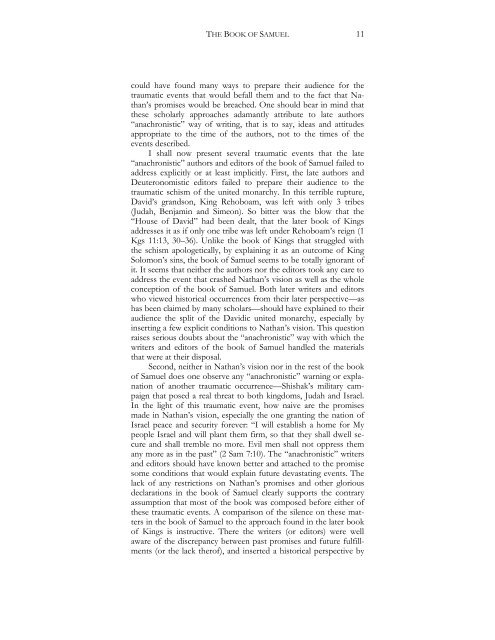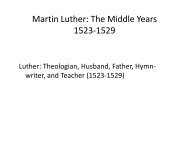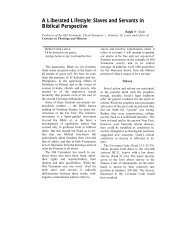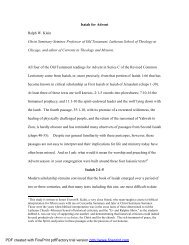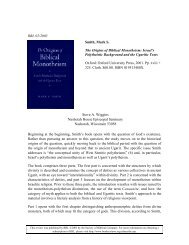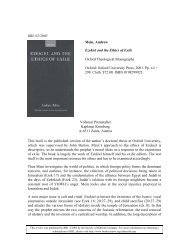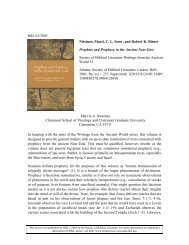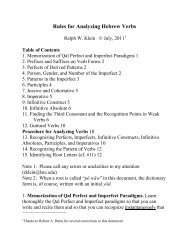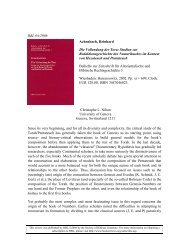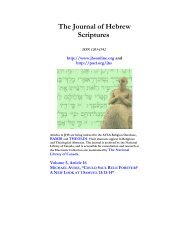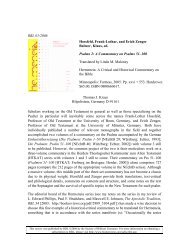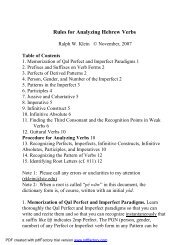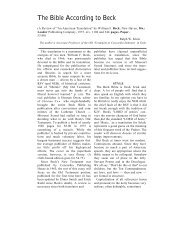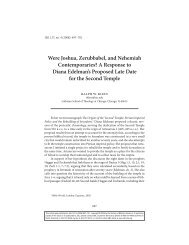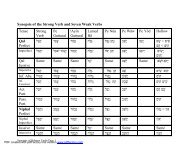The Book of Samuel: Its Composition, Structure and Significance as ...
The Book of Samuel: Its Composition, Structure and Significance as ...
The Book of Samuel: Its Composition, Structure and Significance as ...
You also want an ePaper? Increase the reach of your titles
YUMPU automatically turns print PDFs into web optimized ePapers that Google loves.
THE BOOK OF SAMUEL<br />
could have found many ways to prepare their audience for the<br />
traumatic events that would befall them <strong>and</strong> to the fact that Nathan’s<br />
promises would be breached. One should bear in mind that<br />
these scholarly approaches adamantly attribute to late authors<br />
“anachronistic” way <strong>of</strong> writing, that is to say, ide<strong>as</strong> <strong>and</strong> attitudes<br />
appropriate to the time <strong>of</strong> the authors, not to the times <strong>of</strong> the<br />
events described.<br />
I shall now present several traumatic events that the late<br />
“anachronistic” authors <strong>and</strong> editors <strong>of</strong> the book <strong>of</strong> <strong>Samuel</strong> failed to<br />
address explicitly or at le<strong>as</strong>t implicitly. First, the late authors <strong>and</strong><br />
Deuteronomistic editors failed to prepare their audience to the<br />
traumatic schism <strong>of</strong> the united monarchy. In this terrible rupture,<br />
David’s gr<strong>and</strong>son, King Rehoboam, w<strong>as</strong> left with only 3 tribes<br />
(Judah, Benjamin <strong>and</strong> Simeon). So bitter w<strong>as</strong> the blow that the<br />
“House <strong>of</strong> David” had been dealt, that the later book <strong>of</strong> Kings<br />
addresses it <strong>as</strong> if only one tribe w<strong>as</strong> left under Rehoboam’s reign (1<br />
Kgs 11:13, 30–36). Unlike the book <strong>of</strong> Kings that struggled with<br />
the schism apologetically, by explaining it <strong>as</strong> an outcome <strong>of</strong> King<br />
Solomon’s sins, the book <strong>of</strong> <strong>Samuel</strong> seems to be totally ignorant <strong>of</strong><br />
it. It seems that neither the authors nor the editors took any care to<br />
address the event that cr<strong>as</strong>hed Nathan’s vision <strong>as</strong> well <strong>as</strong> the whole<br />
conception <strong>of</strong> the book <strong>of</strong> <strong>Samuel</strong>. Both later writers <strong>and</strong> editors<br />
who viewed historical occurrences from their later perspective—<strong>as</strong><br />
h<strong>as</strong> been claimed by many scholars—should have explained to their<br />
audience the split <strong>of</strong> the Davidic united monarchy, especially by<br />
inserting a few explicit conditions to Nathan’s vision. This question<br />
raises serious doubts about the “anachronistic” way with which the<br />
writers <strong>and</strong> editors <strong>of</strong> the book <strong>of</strong> <strong>Samuel</strong> h<strong>and</strong>led the materials<br />
that were at their disposal.<br />
Second, neither in Nathan’s vision nor in the rest <strong>of</strong> the book<br />
<strong>of</strong> <strong>Samuel</strong> does one observe any “anachronistic” warning or explanation<br />
<strong>of</strong> another traumatic occurrence—Shishak’s military campaign<br />
that posed a real threat to both kingdoms, Judah <strong>and</strong> Israel.<br />
In the light <strong>of</strong> this traumatic event, how naive are the promises<br />
made in Nathan’s vision, especially the one granting the nation <strong>of</strong><br />
Israel peace <strong>and</strong> security forever: “I will establish a home for My<br />
people Israel <strong>and</strong> will plant them firm, so that they shall dwell secure<br />
<strong>and</strong> shall tremble no more. Evil men shall not oppress them<br />
any more <strong>as</strong> in the p<strong>as</strong>t” (2 Sam 7:10). <strong>The</strong> “anachronistic” writers<br />
<strong>and</strong> editors should have known better <strong>and</strong> attached to the promise<br />
some conditions that would explain future dev<strong>as</strong>tating events. <strong>The</strong><br />
lack <strong>of</strong> any restrictions on Nathan’s promises <strong>and</strong> other glorious<br />
declarations in the book <strong>of</strong> <strong>Samuel</strong> clearly supports the contrary<br />
<strong>as</strong>sumption that most <strong>of</strong> the book w<strong>as</strong> composed before either <strong>of</strong><br />
these traumatic events. A comparison <strong>of</strong> the silence on these matters<br />
in the book <strong>of</strong> <strong>Samuel</strong> to the approach found in the later book<br />
<strong>of</strong> Kings is instructive. <strong>The</strong>re the writers (or editors) were well<br />
aware <strong>of</strong> the discrepancy between p<strong>as</strong>t promises <strong>and</strong> future fulfillments<br />
(or the lack ther<strong>of</strong>), <strong>and</strong> inserted a historical perspective by<br />
11


